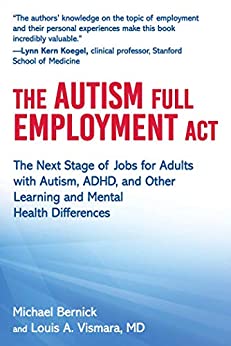by Michael Bernick & Louis A. Vismara
Subtitle: The Next Stage of Jobs for Adults with Autism, ADHD, and Other Learning and Mental Health Differences
While the book has a good premise and well intentions behind it, as someone who is late diagnosed neurodivergent and who has been in the workforce for 30 years before the diagnosis, this book is capitalist propaganda which assumes that individuals need to have a job to have fulfilling lives, and focuses solely on those who were diagnosed in childhood, have strong family supports around them, and live in major cities where autism job clubs and groups can be found to help them get a job. It offers absolutely nothing for the late diagnosed neurodivergent (who is often AFAB) who lives in a rural setting, with no supports outside of friends, and who has done traditional employment which has left them with cPTSD, depression, and anxiety, and who really needs to transition into self-employment for mental wellness. This neurodivergent is not the only one, and I talk to too many neurodivergent individuals who need help moving into self-employment and find themselves without help or support. But back to the book…
The author of this book, and the resources he talks about, are all based in major cities (San Francisco, Atlanta) and at one point says that employers like neurodivergent people because we’re “loyal”. We don’t like change and so we tend to stick with an employer and not change jobs. Sadly this happens all too often with abusive and toxic employment situations, so what? The authors think neurodivergent people are like the dog that returns to an abusive master?
I, like the authors, believe we do need to drastically rethink employment, especially for disabled, chronically ill, and/or neurodivergent individuals, and we had the perfect opportunity with the COVID-19 pandemic. But the authors only provide capitalist solutions, emphasizing that people need jobs to live fulfilling lives, which is an ableist statement, and leaves those who weren’t diagnosed as children, don’t have family supports to help get them “in” with a company, or live in a major area with an autism job club, which the author admits still require a long term investment in the individual to find stable employment. If you find yourself in a “not disabled enough for supports from traditional disability orgs” and “disabled enough to need support” situation like too many do, then this book will let you slip through the cracks, just as our capitalist system does now.
I could write more…so much more as a review…but really, this book is a full employment act for only one small sliver of the full neurodivergent spectrum. I wish the authors had done better. As doctors they should have done better. But too many neurodivergent individuals will understand when I say that honestly, this book was exactly what I expected it to be.


